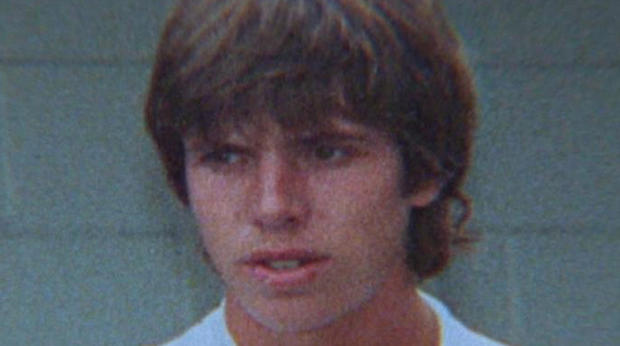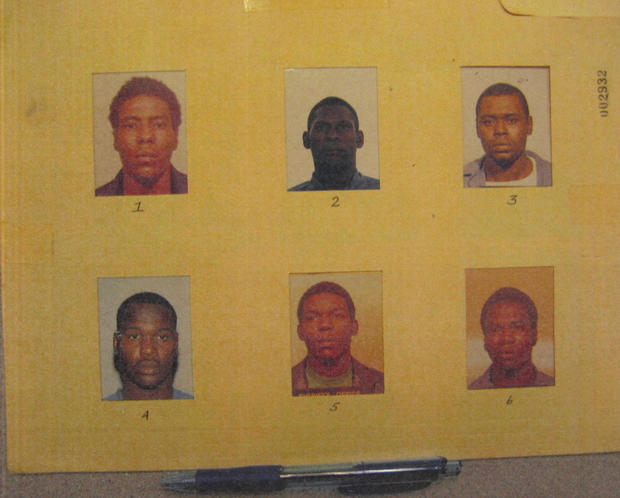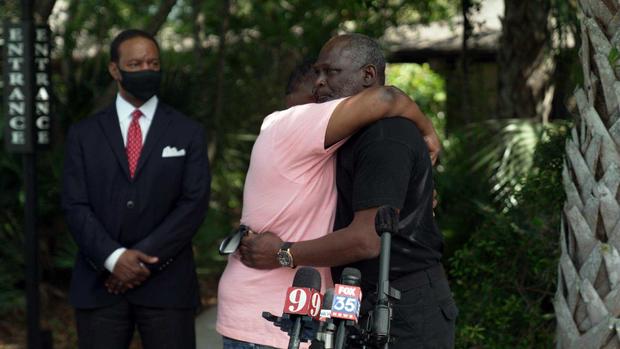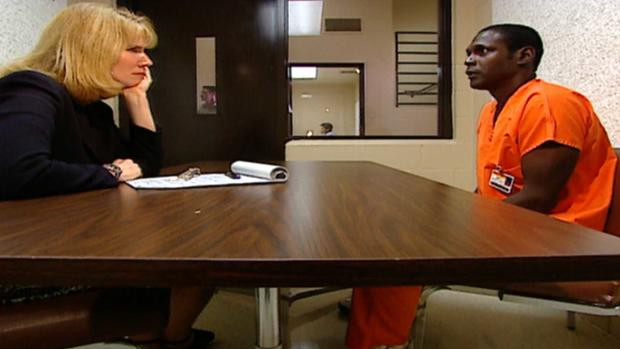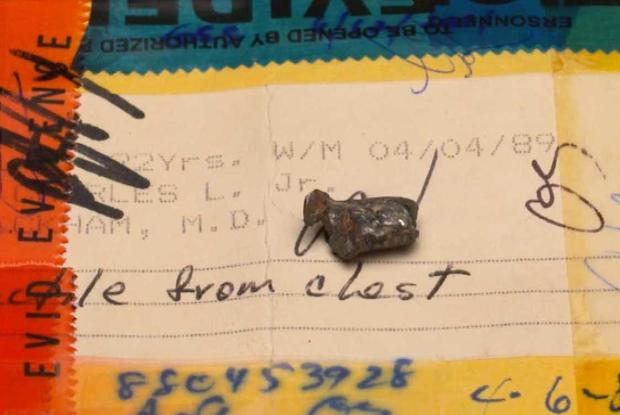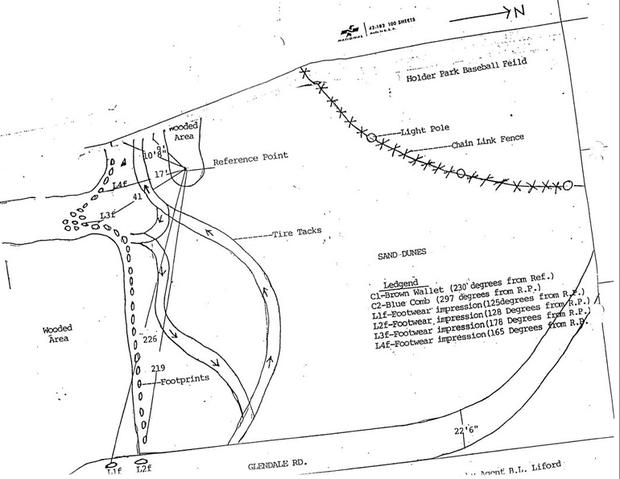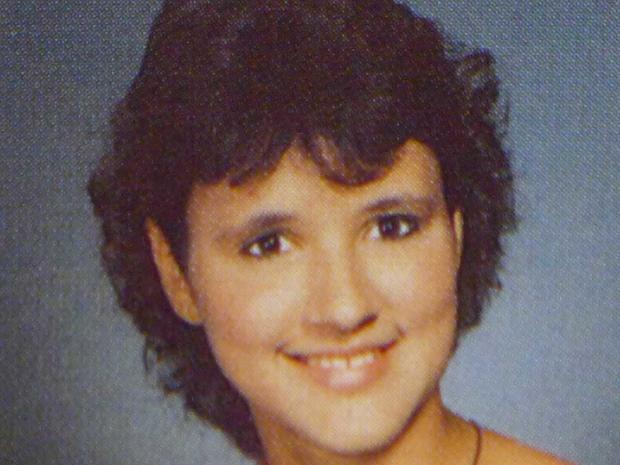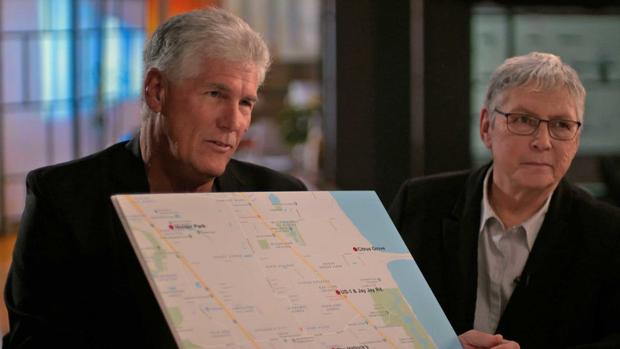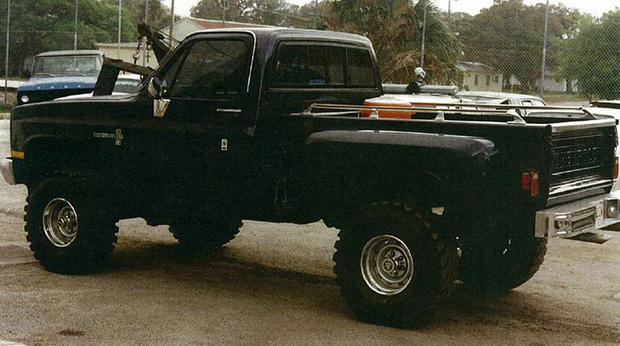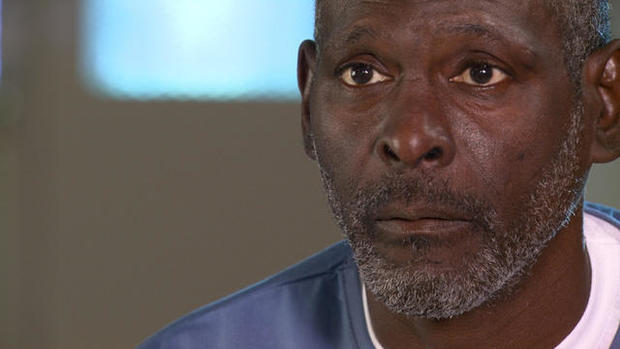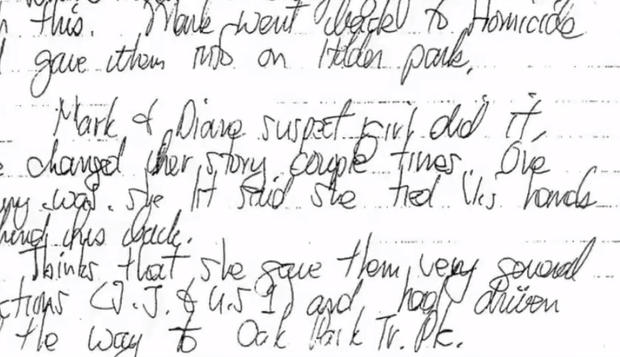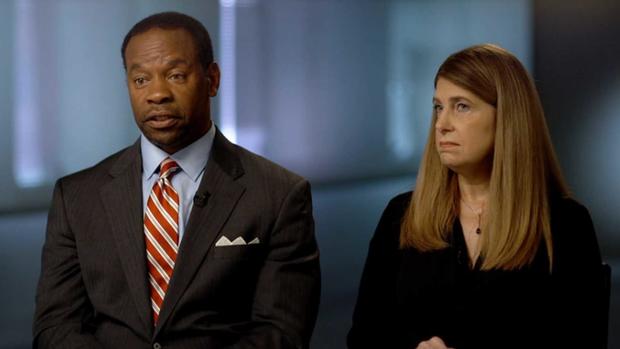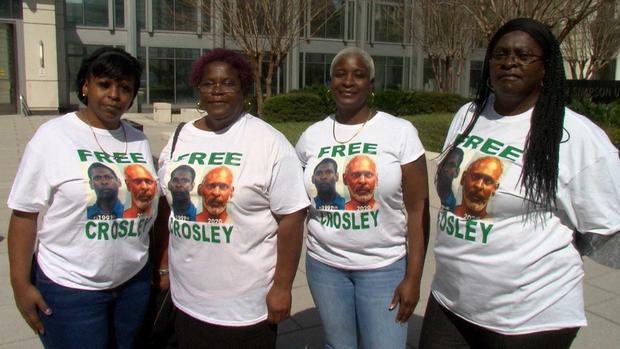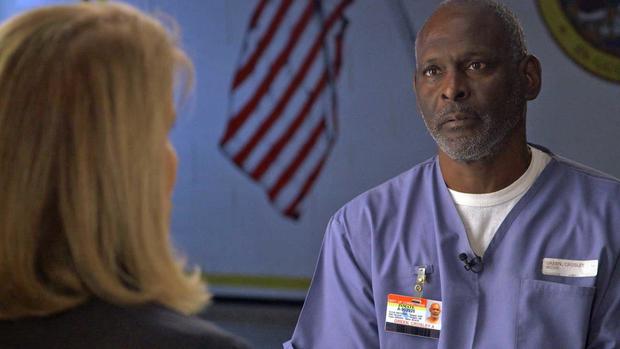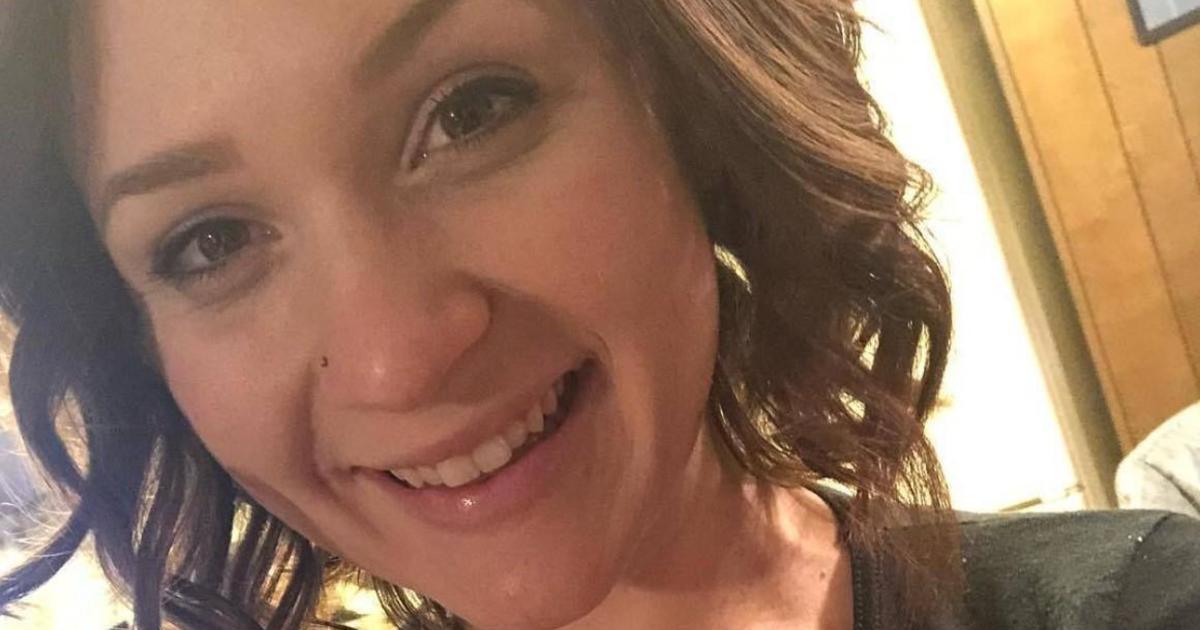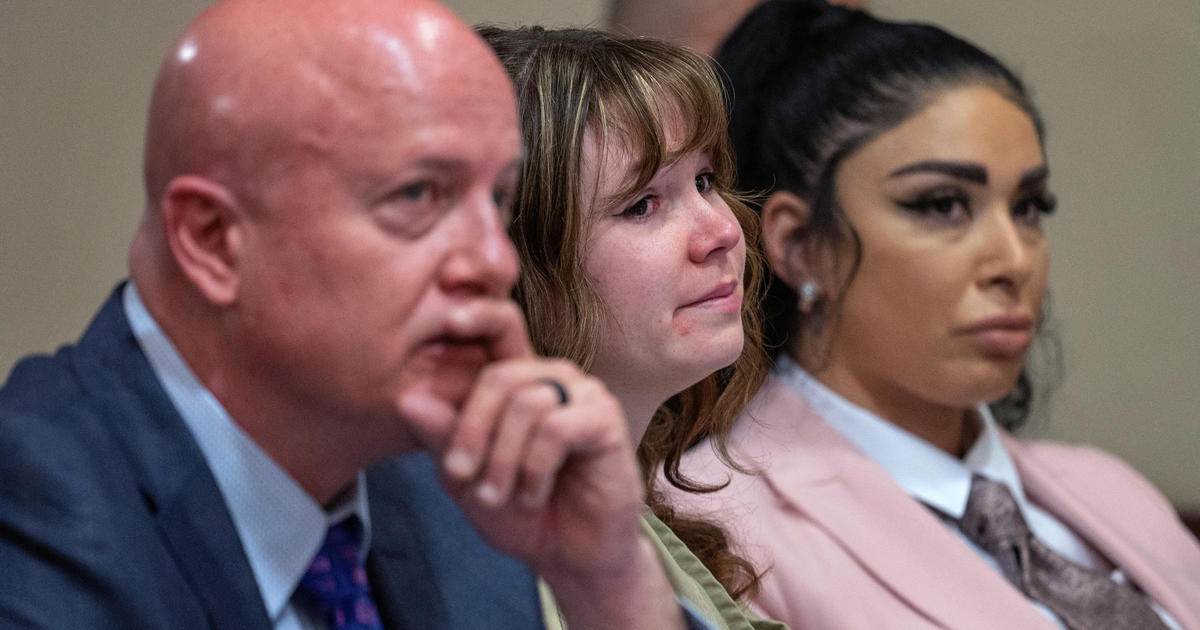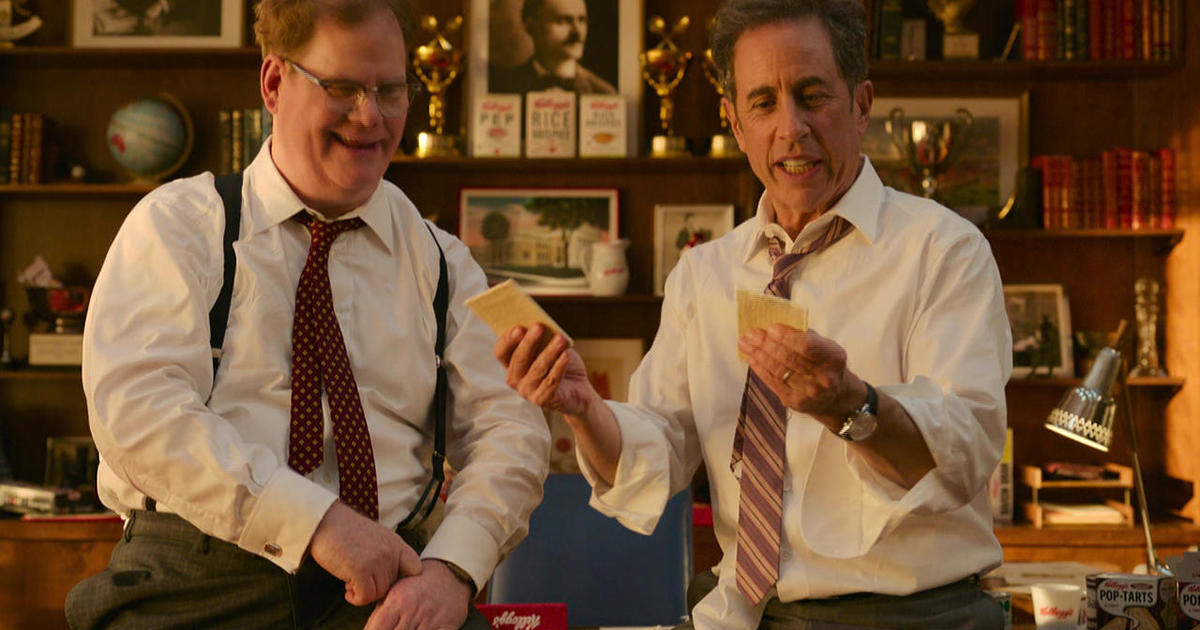Crosley Green, imprisoned for 31 years, says he's the victim of a racial hoax
Produced by Asena Basak
A Florida man remains behind bars, nearly two years after his murder conviction was overturned. Crosley Green has been in prison for more than three decades for a crime he says he did not commit. He was convicted in 1990 of killing a 22-year-old Florida man largely on the testimony of the man's ex-girlfriend. There was no physical evidence tying Green to the case.
"I actually think it's a tragedy that he remains in prison," says Green's attorney, Keith Harrison.
So, why is Green still behind bars? "48 Hours" correspondent Erin Moriarty has followed this case for more than 20 years and shares new details in Green's fight for his freedom.
THE NIGHT CHIP FLYNN DIED
Nearly two years have passed since Green's murder conviction was overturned, and yet he remains in a Florida prison because the state is appealing the federal court's decision.
Keith Harrison | Defense attorney: We've made every legal effort to get him released.
Jeane Thomas | Defense attorney: The state's job is not to uphold convictions. … The state's job is to seek the truth and to seek justice.
Washington D.C. attorneys Keith Harrison and Jeane Thomas typically counsel an elite corporate clientele, but they're working for no pay at all for Green, trying to win his freedom after 31 years of incarceration.
Keith Harrison: The evidence that Crosley Green is innocent is literally overwhelming.
They accuse prosecutors of using faulty evidence and pressuring witnesses to secure the conviction of their client for the murder of 22-year-old Charles Flynn, better known as Chip. Flynn was found shot in a Florida citrus grove in 1989. He had been with his ex-girlfriend Kim Hallock that night.
Hallock told investigators that they had been robbed and hijacked by a man in Holder Park as they sat in Chip's truck a little after 11 p.m.
KIM HALLOCK TO DETECTIVES [audio]: I told Chip "there's a Black guy on your side" and he rolled up the window real quick.
Twenty minutes later, Hallock says, Chip stepped out of the truck and she heard him say "Hold on, man."
DETECTIVE: Did you see that the – the Black male was armed at that time?
KIM HALLOCK: Yes, I did.
KIM HALLOCK: Chip had a gun in his glove box. I took the gun out of the glove box and stuck it under some jeans that were next to me.
She says the man tied Chip's hands with a shoelace, ordered her to hand over money from Chip's wallet, and then with everyone in this truck, she says the assailant drove them to the orange grove steering, shifting gears, and somehow holding a gun on them all at the same time.
Kim Hallock told police that when they got to the grove, the man yanked her out of the truck and then Chip — his hands still tied behind his back—somehow managed to get a hold of his gun that Kim had hidden on the truck seat.
KIM HALLOCK [audio]: He leaned out of the truck and somehow shot at the guy and the guy stepped back, Chip dove out of the truck, I jumped in the truck … and I heard about five or six gun shots.
She said she then drove to a friend's home for help. Brevard County Sheriff's Deputy Mark Rixey and Sgt. Diane Clarke were the first two officers on the scene.
Erin Moriarty: Kim Hallock says that this assailant took both Chip and Kim to this citrus grove at 12:10. And yet, you're not dispatched til 1:13.
Diane Clarke | Retired Brevard County sergeant: It's over an hour.
Keith Harrison: There is approximately an hour that is missing and unexplained.
Erin Moriarty: How crucial was that time that night?
Mark Rixey | Former Brevard County deputy: Matter of life and death.
Diane Clarke: Why is she not stopping some place and making that phone call?
Erin Moriarty: Where could she have called?
Diane Clarke [points to map]: Right here.
Mark Rixey [points to map]: From a payphone … I think there was three along the way. … A convenience store, convenience store. And the hospital is right there.
The directions Hallock gave were so vague that even after Clarke and Rixey were dispatched, it took another 30 minutes to find Chip.
Mark Rixey [points to map]: I get the call at 1:13. I respond to this area. There's nothing there. … Had to notify my dispatch … get better directions. … I drive to this new area here, where they informed me to go. Again, there's nothing there.
Erin Moriarty: Why then were you first sent to the wrong location?
Mark Rixey: That's a good question, one we've been asking ourselves for 30 years.
Diane Clarke: Thirty years, 'cause she didn't tell us where to go. She gave the wrong direction.
Sgt. Clarke ended up sending another deputy to pick up Hallock so she could better guide them.
Diane Clarke: She wouldn't get out the car.
Mark Rixey: We say "Can you show us where? Nope. Not going down there"
Erin Moriarty: What did that say to you, what did you think?
Diane Clarke: There's something wrong … something is not ringing true … I would want to know, "Is he OK?"
They found Chip laying on his stomach with his hands tied behind his back, bleeding from a single gunshot wound to his chest.
Diane Clarke: He was in pain, but … I seriously thought he'd be OK.
Mark Rixey: First words out of his mouth were "Get me outta here. I wanna go home."
Erin Moriarty: Did he mention anything about an assailant?
Mark Rixey: Nope.
Erin Moriarty: Did he mention anything about being robbed.
Diane Clarke: No.
Erin Moriarty: Did he mention anything about being kidnapped?
Clarke and Rixey: No.
Mark Rixey: I'm thinking, "what's going on here?"
Diane Clarke: My feeling about it at the time and still is … that he was protecting her.
Chip Flynn stopped breathing twice as they waited for an ambulance. Sgt. Clarke tried to save his life.
Diane Clarke: He didn't have to die.
Charles Flynn: There wasn't anything he didn't like to do.
Chip's parents Charles and Peggy Flynn, now both deceased, rushed to the orange grove when they got the word Chip had been hurt. But police wouldn't let them near the scene.
Peggy Flynn: I should have been able to go back to see him.
The Flynns, who spoke with "48 Hours" in 1999, were shocked to learn that Chip had been with Kim Hallock that night. Chip had a new girlfriend.
Charles Flynn: That was all he talked about. He didn't mention Kim anymore or anything.
Chip's parents said Kim had become too possessive and overbearing.
Charles Flynn: Chip liked his freedom. And she wanted him to be with her all the time.
Hallock was upset about the breakup, according to Chip's friend David Stroup, who also spoke with "48 Hours" in 1999.
David Stroup: I do remember that he just — that she didn't want to let go.
And it was Stroup's home where Kim Hallock went for help.
David Stroup: I wondered why she came to my place, as opposed to just stopping at the first potential telephone … you know, even a home with a light on or anything if it, you know … So, it's always bothered me.
Kim Hallock was not and has never been a suspect. Homicide detectives from Brevard County Sheriff's Office seemed to take her at her word, despite her delay in calling for help and her inability to describe the assailant very well.
KIM HALLOCK [audio]: I really didn't even get a real good look at him. I was really scared.
Investigators claimed that almost immediately they got a tip that a small-time drug dealer, Crosley Green, was involved. He had recently been released from jail.
Diane Clarke: The description that she had given for the sketch didn't match him.
They showed Hallock a photo lineup, and Kim chose #2, Crosley Green.
Keith Harrison: … his picture is smaller and darker than any of the other pictures. And it's right in, you know, what is often referred to as the bullseye point of a photo array.
Crosley Green admits he was no angel, but he had no history of violent crime.
Diane Clarke: I think he was just an easy pick. … "We're gonna put somebody in jail for this."
Green was arrested and charged with kidnapping robbery and murder despite no direct evidence linking him to Chip's shooting.
Keith Harrison: … there were no fingerprints of Crosley Green or any third person on the truck … Not one single fingerprint.
WHERE'S THE EVIDENCE?
Keith Harrison: There was no case against Crosley Green … There was no case. It was a one witness ID case.
In August 1990, Crosley Green went on trial for the murder of Chip Flynn. The case hinged on the testimony of Kim Hallock – the state's star witness who identified Green as the "Black" man who attacked the couple.
Keith Harrison | Defense attorney: That's the weakest kind of case … where the only evidence you have is somebody said, "that guy did it."
The state claimed there were also shoeprints found at Holder Park. Prosecutor Christopher White, now retired, said a dog followed the scent of those prints to the vicinity of a house where one of Green's sisters lived. White spoke with "48 Hours" in 2015.
Christopher White: The shoe impressions were followed … from the site where the truck was parked … supporting what Kim said about there being a third person there, a Black male, who abducted them and did these things.
Those shoeprints, however, were never linked to Crosley Green. But the prosecution also had three witnesses — all with criminal problems of their own — who claimed Crosley confessed. One was Crosley's own sister, Sheila. She was facing sentencing on drug charges.
The defense argued that Crosley couldn't have killed Flynn because he had an alibi.
Crosley Green [1999]: I can count for my time. I can count for my time.
Crosley says he was seen at the time of the murder by multiple witnesses at a party two miles away.
But his former attorney only called one to testify. And on September 5, 1990, an all-White jury convicted Crosley Green of kidnapping, robbery and murder. He was sentenced to die in Florida's electric chair.
Erin Moriarty: What's it like being here on death row?
Crosley Green: It's hell to me, because I'm here for a crime I didn't commit.
Attorney Jeane Thomas says jurors never heard the real story.
Jeane Thomas: When you look at the all the facts … you see that the state wanted to achieve a certain result. … And they manufactured evidence. They coerced witnesses … to lie.
Even before the trial, Kim Hallock's account had serious inconsistencies. She told police that the assailant had managed to steer Chip's truck, shift gears, all while holding a gun on them. And yet, she told Chip's parents a very different story.
Charles Flynn: She was having to shift the gears for him. He would just match the clutch and she would shift the gears. He was making her do that.
And Tim Curtis, who had sold the truck to Chip Flynn, adds more doubts to Hallock's story. He told "48 Hours" that no stranger could just jump in the truck and drive. It had a custom gear shift and was hard to handle.
Tim Curtis: Here's what any normal person would think, they look, they see a stick shift coming out of the floor … I'm gonna put it in first gear and take off outta here. And that's where he would of made his first mistake.
Erin Moriarty What would've happened?
Tim Curtis: He woulda stalled the truck.
Erin Moriarty: That truck was difficult for anyone to drive. What about Crosley Green?
Keith Harrison: Crosley Green couldn't drive a manual transmission. He couldn't drive a clutch.
Kim changed other parts of her story as well. According to a police report from the night of the shooting, she told a deputy the assailant told her to tie Chip's hands.
But just hours later, in her taped interview: "The Black male was tying Chip's hands."
Erin Moriarty: … those inconsistencies, would that have concerned you?
Christopher White: We're talkin' about who tied him?
Erin Moriarty: Yes, and who shifted the truck.
Christopher White: Of course it would, if she was inconsistent, any inconsistencies.
And yet, another serious inconsistency: Kim's description of the assailant's gun matched a semi-automatic. She said that when she drove away, leaving Chip at that grove, she heard five to six gunshots. But no shell casings were recovered at the scene, and the only bullet found was the one that killed Chip.
Erin Moriarty: Your own expert said … that, in fact, the bullet found in Chip Flynn could have come from his own gun. Did you find another weapon?
Christopher White: Well, no. …
Erin Moriarty: Did you ever find another shell casing to match that weapon?
Christopher White No, and we wouldn't if, in fact, he was shooting a revolver. You understand that —
Erin Moriarty: But in fact, did you find any other bullet holes?
Christopher White: Bullet holes? Not that I'm aware of.
KIM HALLOCK [audio]: Just about then, Chip…his hands were behind his back, he leaned out of the truck and somehow shot at the guy.
But that statement was contradicted by the evidence. Investigators found no gunshot residue on Chip Flynn's hands.
Mark Rixey: The fact that his were tested and did not show any gunshot residue contradicts her story. … And I totally don't believe someone could actually jump outta that truck and shoot a gun behind their back with their hands tied anyway.
Christopher White: … when you look at this case, it is all circumstantial. I would love to have had a stronger case. But it is what it is.
As for those shoeprints at the park, criminalist Lisa DiMeo, who helped Crosley's defense team, told "48 Hours" that diagram shown at trial contradicts the actual crime scene video.
CRIME SCENE VIDEO: These shoeprints after proceeding west will then continue on around just to the outside of this fence ...
If these were the tracks of the assailant, they should end where the truck was parked. But, in fact, DiMeo says they continue past the truck, along the fence, and appear to leave the park.
Erin Moriarty: How can they belong to the assailant if in fact he got in the truck back here? They couldn't.
Lisa DiMeo: No, no they couldn't.
The trail of prints leaving Holder Park is missing from the diagram.
Erin Moriarty: This diagram supports Kim Hallock's story. But this diagram doesn't match the evidence at the scene?
Lisa DiMeo: Correct. … This was necessary to make her story fit.
What's more, every one of the three witnesses who testified that Crosley Green confessed – recanted after trial.
Keith Harrison: There's a pattern that supports the fact that these folks were coerced.
Erin Moriarty: When a sister testifies against her own brother and says he confessed … it's hard to believe that could be coerced.
Keith Harrison: Absolutely. She recanted almost immediately.
"48 Hours" tracked down Sheila Green in 1999.
Erin Moriarty: What did they say would happen if you didn't testify against your brother?
Sheila Green: I would never see my kids again.
She told us she had no choice but to lie on the stand.
Erin Moriarty: Did Crosley ever tell you that he killed Chip?
Sheila Green: I never even talked to Crosley. He never told me that. … Basically, they told me that this was my last chance to help myself because I was already convicted.
Erin Moriarty: But this is your own brother, Sheila.
Sheila Green: He will understand
Erin Moriarty: You think he will?
Sheila Green: Yes, he will, he knew I [cries].
FIRST RESPONDERS SPEAK OUT
Kenneth Nunn: Florida had a long history of being engaged in slavery, in the plantation economy … that has passed itself on to the criminal justice system here in the state.
Kenneth Nunn, a professor at the law school at the University of Florida says the odds were stacked against Crosley Green in that Florida court room.
Kenneth Nunn: I would say that Crosley Green's case is a miscarriage of justice.
Keith Harrison | Defense attorney: If you read the … the trial transcript … the prosecutor was using race to fill the gaps in the evidence.
During trial, the defendant's race was referred to 140 times.
Erin Moriarty: And what kind of impact does it have … in front of an all-White jury with the very last thing these jurors hear, "There's no mystery … why Crosley Green … took this woman to the orange grove."
Kenneth Nunn: What we're talking about is this mythology that Black men are uniquely criminal in their behavior … we think they are — are potential rapists.
KIM HALLOCK [audio]: I told Chip "there's a Black guy on your side."
Kenneth Nunn: … and she accuses a Black person of committing this crime. Who are they gonna believe?
And what has defined this case from the very beginning is that Kim Hallock was treated as a victim, never as a possible shooter.
Mark Rixey | Former Brevard County deputy: Everybody on the scene is a suspect until they're not. … Every single person is tested for gunshot residue … that's not what happened here.
To this day, first responders Diane Clarke and Mark Rixey question why Brevard County detectives failed to do even a basic investigation of Kim Hallock.
Erin Moriarty: Kim Hallock was taken in and questioned at 4:30, but not recorded until 8:20 … What does that say to you?
Diane Clarke | Retired Brevard County sergeant: Well, she had time to get her story the way she wanted it. … She was not a suspect.
Erin Moriarty: Did it ever occur to you or anyone else that maybe Kim … Hallock wasn't telling the truth?
Christopher White | Former prosecutor: Well, of course it did.
Erin Moriarty: Then why wasn't she ever investigated? Why was she never a suspect?
Christopher White: What was, what was supposed to be … What do you mean?
Erin Moriarty: No G.S.R. taken of her hands? Why not?
Christopher White: I don't know if there was or wasn't at this point—
Erin Moriarty: There wasn't … Why weren't pictures taken of her hands, her arms, to see if she had any injuries?
Christopher White: I guess they could've done more examination. I'll give you that, OK?
Crosley Green's lawyer Keith Harrison finds it mind-boggling.
Keith Harrison: Chip Flynn had broken up with Kim Hallock. He was seeing another woman. … Kim Hallock was very upset about that.
Keith Harrison: That's the oldest motive in the book.
Erin Moriarty: Jealousy?
Keith Harrison: Jealousy.
Still, White took Kim Hallock at her word.
Christopher White: You've gotta understand. It's kind of a small community here in Titusville. Kim Hallock lived … at the, in the area where I lived.
Christopher White: I don't see how there's anything here concrete to tell anybody that Kim Hallock lied.
But there were those obvious red flags with her story. There was no moon on the night Chip Flynn was shot; it was completely dark in that orange grove.
Keith Harrison: Based on her testimony, she said she didn't get a really good look at him.
Yet Kim Hallock chose Green out of a photo lineup — a flawed line up. Professor Nunn says that is no longer allowed under Florida's current laws.
Kenneth Nunn: You can't tell the witness that the suspect is in the batch … and that happened in this case … you have to make sure that the photograph matches all the other photographs … his head is smaller than the other ones … so he stands out.
Erin Moriarty: Would you do this today?
Christopher White: Well, no, no. Ideally, I would not.
Erin Moriarty: Could she have picked the wrong person?
Christopher White: I don't think she did, you know? … Was she guessing more than she was sure? I couldn't tell you for sure.
Christopher White: That still leaves you with the issue of whether or not it's Crosley. And you have arguments pro and con about that. But the one thing I'm sure of, based on the evidence in this case, it wasn't Kim Hallock.
Mark Rixey: She was the only other one there. Who else woulda done it? … the only way all the facts are reconciled is if she shot him.
Mark Rixey: I told everybody I ran into who had any interest in it … I thought she did it. I told the homicide sergeant. I told the homicide investigator.
And four months after the shooting, both Rixey and Clarke met with prosecutor Christopher White. They wanted to make sure he knew of their suspicions of Kim Hallock.
Erin Moriarty: And how did Chris White take that information?
Mark Rixey: He was dismissed — dismissive.
Diane Clarke: I said to him … "She is involved … and I don't believe it's the person you arrested." … I never heard anything else about it afterwards.
Mark Rixey: I think that they got into an argument, she pulled the — gun out of the glove box, and either intentionally or unintentionally shot him … They freak out … I don't want to get into trouble. We gotta come up with a story. … Let's make up this story.
Erin Moriarty: Why didn't you then take their word seriously?
Christopher White: I reviewed all the evidence that we had with that hypothesis in mind. … do they give me cause to believe that Kim Hallock may have committed this murder? … my answer is no.
Erin Moriarty: You're that sure that Crosley Green is innocent?
Mark Rixey: I would bet my life on it, yes.
But in 2000, 11 years after Chip Flynn's murder, the state claimed it had more evidence against Green: two tiny body hairs allegedly found in Flynn's truck. They tested them for DNA.
Crosley Green [2000]: Matter of fact, I wanted 'em to test it … I hadn't been in that truck, I never been in that truck.
Christopher White: There was sufficient DNA there to obtain a result using MTA DNA.
That DNA – mitochondrial— cannot be used to identify a specific person – it can only identify broad family relations. And Crosley Green could not be excluded from that group.
Jeane Thomas | Defense attorney: It's not a match. … the mitochondrial DNA test cannot definitively say, "This DNA is this individual's DNA." … Crosley's maternal relatives for example would be in this group that is not excluded.
And in fact, Crosley's brother O'Connor believes the hairs could be his. He happened to be a friend of Tim Curtis, the original owner of the truck
O'Connor Green: It's possible. 'Cause I drove the truck kinda regular. I'm not tellin' I drove the truck one or two time. I done drove the truck several time.
Erin Moriarty: Are you at all troubled by the fact that … Crosley Green could not be eliminated?
Mark Rixey: That's nothing. That's not evidence, that is not evidence … it does not tie him specifically to that truck.
Erin Moriarty: You have that one hair that could've come from someone else, his brother.
Christopher White: Uh-huh.
Erin Moriarty: Is there any other physical evidence, anything, that connects Crosley Green to this case?
Christopher White: Well I — I guess the simple answer to that is no.
In 2009, after 19 years facing execution on death row, Crosley Green's attorneys won a major victory: because of an error in sentencing, Green was taken off death row.
Crosley Green: I felt real good at that time … But I know I have another hundred yards to go.
But Crosley Green's request for a new trial was denied. Even though some of the evidence was now in question and all those witnesses who testified against him said they lied on the stand.
Erin Moriarty: Have you ever had a case where three witnesses have recanted and lied? Have you ever had a case? Three?
Christopher White: You know, I never have.
Erin Moriarty: That doesn't trouble you?
Christopher White: Not coming from those people with those ties to the Green family and the Green family being what it is, no. It doesn't trouble me a great deal.
But in an odd twist of fate, Christopher White provided just what Crosley Green's defense team had been waiting for.
Keith Harrison: I was shocked … I knew immediately that this was a game changer.
FIGHTING FOR HIS FREEDOM
Crosley Green [2020]: I've been without my family for quite some time now. … I'm ready to go home. And hopefully I get that chance to go home.
Crosley Green was just 19 when his parents died, and he assumed the role of "papa" to his large family. It is why Crosley's murder conviction was so deeply felt by his oldest child, Shuma, his brother O'Connor, and sisters Shirley and Degrah.
Degrah Green: I hope, and I pray that one day Papa will be set free. … Because he didn't do what they say he did.
O'Connor Green: I worry about him a lot … And … it's breakin' the family, its breakin' the family down.
Shuma was 16 and his brother Gaston was 6 when Crosley was sentenced to death.
Shuma Green: It damaged us…. I got rebellious. I just went to gettin' in trouble. No sense of direction … 'Cause my dad was gone.
Crosley Green: I never was with my sons when they grew up, you know … And I got grandkids now … I don't know how much time I got left on earth myself. But the little time I will have left, if I'm out there, it would be with them.
But Crosley Green will never be able to make up lost time with two of his sisters; they died while he's been in prison.
Crosley Green: Brenda and Tina.…That's been tough. That's been tough. … they have been with me all the up till the time they died.
Erin Moriarty: You miss them?
Crosley Green: Yeah [his eyes well with tears].
As for Sheila, the sister who helped put him on death row? He forgave her years ago.
Erin Moriarty: Does she feel a lot of guilt?
Crosley Green: Of course, she do. But that's my sister and I want her to know that I love her and — no matter what. I'm not angry at her.
What happened to Crosley Green is questionable — but may not have been unusual in the late 1980's in Brevard County.
Keith Harrison: What surprises us actually is that there were a series of cases that followed the same pattern.
Three other convictions obtained by the Brevard County State Attorney's Office were later overturned and the men exonerated. Two of them had been prosecuted by Christopher White.
Keith Harrison: The investigation and the prosecution ignored certain evidence, used techniques like dog tracking and jailhouse confessions … just like Crosley Green's case … descriptions didn't match the descriptions of the perpetrators.
Erin Moriarty: How do you feel about that?
Christopher White: I feel that it's a terrible thing that an innocent person would be put behind bars. … But we presented the evidence. It laid out like it did, and it went the way it did.
Erin Moriarty: As you sit here today, do you believe Crosley Green is the man who shot Chip Flynn?
Christopher White: Yes, I do. Yes, I do.
Yet, as it turns out, a decision White made back in 1989 would turn the tide for Crosley Green.
Keith Harrison [reading]: "Mark and Diane suspect the girl did it. She changed her story a couple of times."
Former prosecutor Christopher White took these notes after his meeting with Mark Rixey and Diane Clarke when they told him their suspicions about Kim Hallock.
Keith Harrison [reading White's notes]: One thing was, "she tied his hands behind his back. She never asked how the victim was while at the homicide. She wouldn't go down there to the scene. Why wouldn't the guy say who shot him?"
White never turned those notes over to Crosley's original lawyer.
Keith Harrison: This is the evidence of innocence that was hidden … by the prosecutor
Erin Moriarty: What was your reaction when you first read those notes?
Keith Harrison: I was shocked. … I really couldn't believe it.
Keith Harrison: They can't just hide that evidence … They can't cover it up. They have to disclose it to the defense.
Defense attorney Jeane Thomas says those notes — which included inconsistencies in Kim Hallock's story — would have been crucial at trial.
Jeane Thomas: It goes … to the heart of the defense theory of the case. That there was no Black man at the scene of this crime … That it was these two teenagers, that there was an accident … And then there was a story that was made up after the fact.
Keith Harrison: …those notes … would have had a tremendous impact on the case.
And for that reason, Crosley Green got his first real break since he was taken off death row. In July 2018, federal judge ruled that – by withholding those notes – prosecutors violated Crosley Green's right to a fair trial. His conviction was overturned, and the judge ordered a new trial.
Jeane Thomas: It was a miracle that finally there was a court that … said, "Yes, his constitutional rights were violated."
Crosley Green: I feel great. … I feel I'm goin' home.
Erin Moriarty: When his conviction was overturned, what did you think would happen?
O'Connor Green: Man, I thought my brother'd be home.
But Crosley remained in prison. There was no new trial because the state appealed the decision, and everything was put on hold.
Kenneth Nunn | Professor, University of Florida Law School
There comes a point when there is so much evidence of wrongdoing that we should … say … that we feel that this is a — a conviction that we can defend?
Crosley Green waited another 19 long months behind bars before his lawyers finally got to speak before the Court of Appeals.
Erin Moriarty: How much is riding on that hearing?
Keith Harrison: Literally everything.
WHAT'S NEXT?
Crosley Green: Given a fair chance at provin' you're innocent is what counts. … Let me tell my story to the court system.
On March 12, 2020, Crosley Green's attorneys and those from state of Florida face off in front of the US Court of Appeals. At stake: will this court agree that Crosley Green deserves a new trial?
Erin Moriarty: You nervous?
Crosley Green: Me, to be honest with you I don't know if I'm nervous or not. I just want it to come and go.
Green is not allowed to go to Jacksonville, Florida, to hear the oral arguments. But his family has shown up in force.
Family prayer circle: Dear Heavenly Father, we thank you for bringing us here together … We just ask that you to move miracles today Heavenly Father… Amen.
There are Crosley's sons, nieces, nephews, and his siblings. Even Sheila, the sister who once testified against him, is here to support him.
Shirley Green: We have not forgotten about you … And we not givin' up … Because we know he's innocent.
The focus of the hearing: those notes prosecutor Christopher White took after meeting with Diane Clarke and Mark Rixey 31 years ago.
Keith Harrison: We're gonna be focused on what the impact would have been if the government had not hidden these notes.
No cameras are allowed, but audio from the hearing was later made public.
KELLIE NIELAN [audio]: We are here appealing an order that … granted a new trial to Mr. Crosley Green.
Assistant Attorney General Kellie Nielan argues that the notes withheld from Green —pointing to Kim Hallock—were simply opinions of first responders and would not have made a difference at his trial.
KELLIE NIELAN [audio]: These two deputies never did anything in this case … they administered first aid to the dying victim, they collected a firearm, they roped off the scene. And that's all they had to do with this case.
But defense attorney Keith Harrison says they were crucial:
KEITH HARRISON [audio]: These officers in these notes were trying to paint a picture for the prosecutor that they had the wrong man … Defense had no idea about any of that.
JUDGE 1: Are you saying that prior to trial, defense council did not know what the two detectives thought?
KEITH HARRISON: Absolutely.
After the hearing, Crosley's family is hopeful.
Shirley Green [outside court]: I really felt good. I felt like the day was our day.
O'Connor Green [outside court]: … his kids and his grandkids them all love him— love him to death …We want him to know that they are rooting for you, Grandaddy.
Erin Moriarty [outside court]: What's the best case here?
Keith Harrison [outside court]: The court rules in our favor and at that point we would move for Crosley's immediate release from prison.
Keith Harrison: That should end this case. Because the state doesn't really have the evidence to go forward with a new trial.
Will the state retry him? The Florida Attorney General's office wouldn't comment on a pending case.
Keith Harrison: If the state decides to go forward with a trial, we're — we're gonna defend Crosley. And we're gonna make sure the jury hears all the evidence this time around.
Jeane Thomas says that at least eight alibi witnesses, who were at that party with Crosley Green are ready to take the stand for him.
Jeane Thomas: … it's quite a number of alibi witnesses who tell a very consistent story.
Erin Moriarty: If there is a new trial, it's not gonna just be Crosley Green who's on trial, is it?
Jeane Thomas: Well, in any trial, the credibility of the witnesses is a key factor. … You can be sure that some of the inconsistencies … in Kim Hallock's story that would, of course, be featured.
Kim Hallock has not responded to "48 Hours'' repeated requests for an interview.
Jeane Thomas: She's the star witness for the state. In fact, in a lot of ways, she is the only witness for the state.
Keith Harrison: This case is really bigger than just about … one man who's been wrongfully convicted. This case goes to fundamental fairness in our criminal justice system.
Kenneth Nunn: I think what matters about Crosley Green's case is what it says about us. … are we a society that really cares about justice? Or do we just pay lip service to it? Is it OK for a person who hasn't committed a crime to spend decades in prison and time on death row for something he didn't do?
Crosley Green went to prison when he was 31 years old; he turns 63 in September. We wanted to update his story now – although we don't know when the appellate court will rule – and like all inmates, Crosley is facing a new threat as the coronavirus is spreading in prisons. When we spoke to him in February, he remained hopeful.
Erin Moriarty: From all the times I've talked to you, this is the closest you feel that … you've come to really feeling you might be free someday.
Crosley Green: Yes, yes.
Erin Moriarty: What does that feel like then?
Crosley Green: it's unbelievable. It's unbelievable. … I'm just hopin' and prayin' that day comes soon.
"48 Hours" will continue to follow Crosley Green's case.
